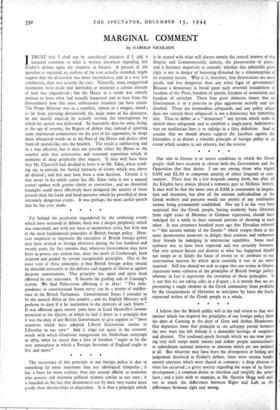Yet behind the perplexity engendered by the confusing events which
have occurred in Athens, there was a deeper perplexity which was concerned, not with any local or momentary crisis, but with one of the most fundamental principles of British foreign policy. How- ever empirical or imprecise the execution of British foreign policy may have seemed to foreign observers during the last hundred and twenty years, the fact remains that, whatever Government may have been in power, our system has, since the death of Castlereagh, been inspired and guided by certain recognisable principles. One of the most vital of these principles is that British foreign policy should be directed constantly to the defence and support of liberal as against despotic constitutions. This principle has again and again been affirmed by our statesmen. It became the guiding rule of Canning's system. We find Palmerston affirming it in 1832: "The inde- pendence of constitutional States never can be a matter of indiffer- ence to the British Parliament. Constitutional States I consider to be the natural Allies of this country ; and no English Ministry will perform its duty if it be inattentive to the interests of such States." It was affirmed again twenty years later in Lord Granville's famous memorial to the Queen, in which he laid it down as a principle that it was the duty of any British Government to give support to "those countries which have adopted Liberal Institutions similar in Liberality to our own." And it rings out again in the resonant words with which Gladstone inaugurated his Midlothian campaign in 1879, when he stated that a love of freedom "ought to be the very atmosphere in which a Foreign Secretary of England ought to live and move."


























 Previous page
Previous page